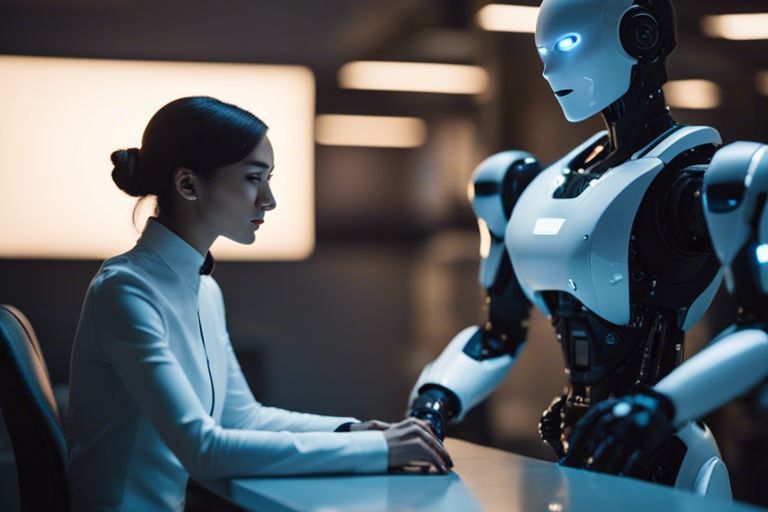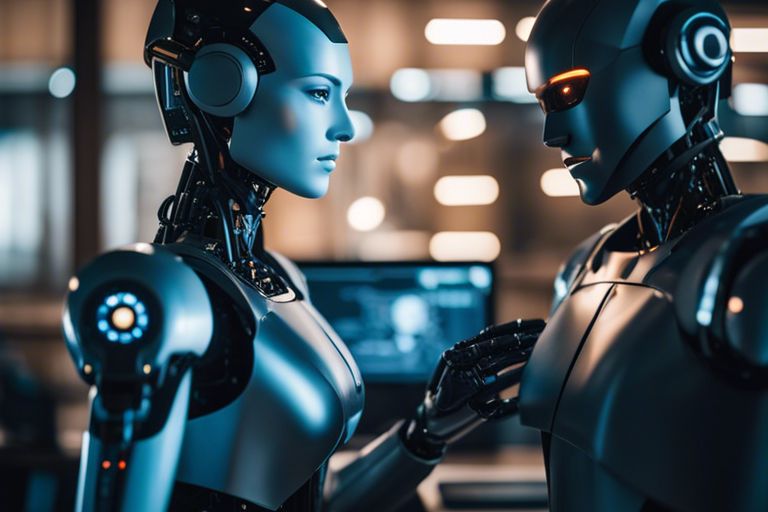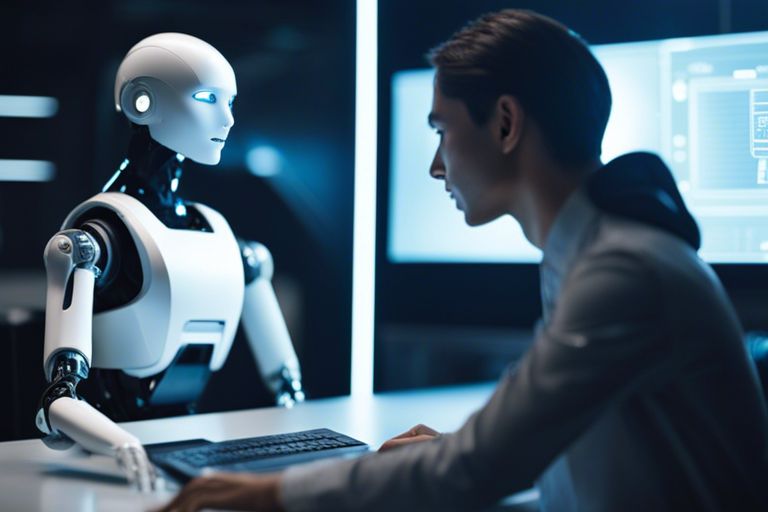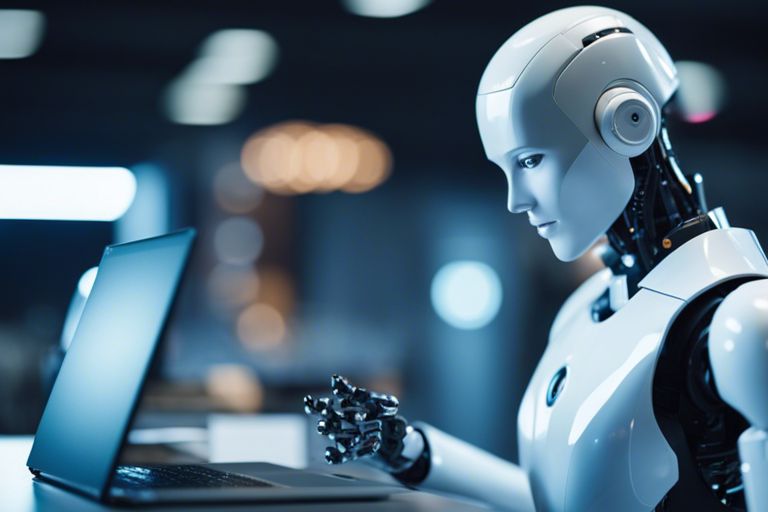Most conversations about the future of work inevitably circle back to Artificial Intelligence (AI) and its profound impact on the job market. The rapid advancements in AI technology are reshaping industries, creating new opportunities, but also raising concerns about job displacement and the need for upskilling. In this blog post, we will examine into the transformative power of AI in the workplace and explore how individuals and organizations can navigate this ever-evolving landscape.
Key Takeaways:
- Accelerating Change: Artificial intelligence is revolutionizing the way we work, leading to rapid changes in industries and job roles.
- New Skill Demands: The future of work will require individuals to adapt and upskill to stay relevant in a world where AI and automation play significant roles.
- Collaborative Future: Embracing AI in the workplace can lead to new opportunities for collaboration between humans and machines, unlocking innovative solutions and advancements.
The Rise of Automation
Artificial Intelligence is heralding a new era of automation, where tasks that were once performed by humans are now being taken over by machines. This shift is reshaping industries across the board, from manufacturing to customer service, as AI technologies become more advanced and capable.
1. How is AI impacting job automation?
2. What are the consequences of increased automation in the workplace?
3. Will automation lead to widespread job loss?
4. Can AI and humans work together in automated environments?
5. How can businesses prepare for the rise of automation?Job Displacement: The Dark Side of AI
Any discussion of automation and artificial intelligence inevitably leads to the dark side of the coin – the potential for job displacement. As AI takes over more tasks traditionally performed by humans, there is a real concern that many jobs will become obsolete, leading to widespread unemployment in certain sectors.
1. What are the risks associated with AI and automation in the workforce?
2. How can society mitigate the impact of job displacement caused by AI?
3. What role does education play in preparing for job displacement due to automation?
4. Are there any industries that are more vulnerable to job displacement by AI than others?
5. How can policymakers address the challenges of job displacement in the age of automation?New Job Creation: The Silver Lining
For every job that is displaced by automation, new opportunities are also created. This silver lining of AI lies in the emergence of new roles that require human skills which machines cannot replicate. As industries evolve, there is a growing demand for individuals who can work alongside AI systems, create and maintain them, and develop new applications for their use.
1. What new job roles are being created as a result of AI and automation?
2. How can individuals prepare themselves for the new job opportunities brought by AI?
3. Will AI lead to a net gain or loss of jobs in the long run?
4. What are the skills that will be most in-demand in an AI-driven economy?
5. How can companies foster a workforce that embraces new job opportunities created by AI?For a deeper look into the impact of artificial intelligence on the future of work, it is crucial to consider the dual nature of automation. While job displacement is a valid concern, the potential for new job creation offers hope for a more dynamic and skill-diverse workforce. Navigating this transition will require a combination of proactive measures from businesses, policymakers, and individuals to ensure a smooth adaptation to the evolving landscape of work.

The Skills Revolution
Clearly, with the rapid advancement of artificial intelligence (AI) technologies, the skills required in the workforce are evolving at an unprecedented pace. To adapt to this changing landscape, individuals must embrace lifelong learning and continuously upskill and reskill themselves to stay relevant in their careers. The traditional model of education followed by a linear career path is no longer sufficient in the face of automation and AI.
1. How can individuals prepare themselves for the future of work in the age of artificial intelligence?
2. What are the key skills that will be in demand in the AI-driven economy?
3. Discuss the role of continuous learning in the context of AI transforming the job market.
4. How can organizations support employees in upskilling and reskilling initiatives?
Upskilling and Reskilling: The Need of the Hour
One necessary aspect highlighted in the IMF report Gen-AI: Artificial Intelligence and the Future of Work is the urgent need for upskilling and reskilling the workforce to meet the demands of an AI-driven economy.
1. Why is upskilling and reskilling necessary in the era of artificial intelligence?
2. How can governments promote and support upskilling and reskilling programs for workers?
3. Discuss the implications of not investing in upskilling and reskilling initiatives in the AI era.
4. What are some effective strategies for individuals to upskill and reskill themselves for the future of work?
The Emergence of New Job Roles
Needless to say, the rise of artificial intelligence is also giving birth to entirely new job roles that were unheard of a decade ago. From data scientists to AI ethicists, these emerging professions require a diverse set of skills and expertise to navigate the complexities of an AI-driven world.
1. Explore the impact of AI on the creation of new job roles and professions.
2. What are some examples of innovative job roles that have emerged in the era of artificial intelligence?
3. Discuss the role of creativity and adaptability in excelling in new job roles shaped by AI.
4. How can individuals prepare themselves for careers in newly emerging fields influenced by AI technology?
To research deeper into the emerging job roles brought about by artificial intelligence, it is necessary to understand the intersection of technology and human expertise. As AI continues to transform industries, individuals with a blend of technical skills and domain-specific knowledge will be in high demand.

The Human Touch
Many experts believe that in an increasingly automated world, the human touch will become even more valuable. As Artificial Intelligence (AI) continues to evolve, certain skills and qualities will remain uniquely human and necessary in the workplace. Here are some chatGPT prompt samples related to this subsection:
- How can humans differentiate themselves from AI in the future of work?
- Discuss the importance of emotional intelligence in the age of automation.
- What are some examples of jobs that require a strong human touch?
- How can empathy play a role in job security in the era of AI?
- Explore the significance of creativity in maintaining human relevance in the workforce.
Emotional Intelligence: The Key to Human Relevance
To stay relevant in a world where machines are rapidly advancing, emotional intelligence is becoming increasingly important. Understanding and managing emotions, both in oneself and in others, can set humans apart from AI. According to McKinsey’s report on Generative AI and the future of work in America, those with high emotional intelligence are likely to thrive in the evolving job landscape.
- How does emotional intelligence contribute to job success in the age of AI?
- Why is emotional intelligence considered a crucial skill for the future of work?
- What are some practical ways to develop emotional intelligence in the workplace?
- Discuss the impact of emotional intelligence on leadership in the era of automation.
- How can emotional intelligence be leveraged to enhance collaboration in a tech-driven environment?
Creativity and Empathy: The AI-Proof Skills
With machines excelling at routine tasks, creativity and empathy are becoming the AI-proof skills that define human relevance. These qualities allow individuals to connect on a deeper level, think outside the box, and adapt to ever-changing circumstances. Harnessing creativity and empathy enables humans to bring unique perspectives and solutions to the table, necessary in a world driven by constant innovation.
- How can creativity and empathy give humans a competitive edge in the workplace?
- Discuss the role of creativity in problem-solving in the era of AI.
- Why are empathy and emotional intelligence considered crucial skills for future-proofing one's career?
- Explore how creativity and empathy can foster a more inclusive work environment.
- What are some ways to cultivate creativity and empathy in a technology-driven society?
With AI taking on more repetitive and analytical tasks, the focus is shifting towards the unique abilities that make us human. This transition emphasizes the importance of nurturing emotional intelligence, creativity, and empathy in the workforce to ensure that individuals remain irreplaceable in a world increasingly dominated by intelligent machines.
This human touch factor is not just a competitive advantage in the job market but also a fundamental aspect of what makes us distinctly human. As we navigate the evolving landscape of work and technology, honing these skills will be key to adapting, thriving, and shaping a future where humans and AI complement each other in unprecedented ways.

Navigating the Transition
Your journey through the evolving landscape of work in the age of artificial intelligence will require a keen understanding of the changing dynamics and proactive measures to adapt. Here are some ChatGPT prompts to help you navigate this transition:
1. How can individuals prepare themselves for the impact of AI on the job market?
2. What are the key skills that will be in demand as AI continues to reshape industries?
3. Discuss the role of continuous learning and upskilling in navigating the AI-driven workplace.
4. How can businesses effectively manage the transition to an AI-integrated workforce?
5. Explore the ethical considerations in AI adoption within organizations.Government Policies and Regulations
Transitioning into a future where artificial intelligence plays a significant role in the workforce requires thoughtful government policies and regulations to ensure a fair and inclusive environment. Here are some ChatGPT prompts to examine deeper into this crucial aspect:
1. What regulatory frameworks are needed to govern the use of AI in the workplace?
2. How can governments promote AI adoption while safeguarding workers' rights?
3. Discuss the role of policymakers in addressing the ethical dilemmas posed by AI in employment.
4. Explore the impact of AI on labor laws and social security systems.
5. How can governments collaborate with industry stakeholders to shape responsible AI policies?Corporate Social Responsibility in the AI Era
Transitioning toward a future intertwined with artificial intelligence necessitates a strong commitment to corporate social responsibility. Organizations must navigate this new landscape with a focus on ethical practices and societal well-being. Here are some ChatGPT prompts to explore this crucial aspect:
1. How does corporate social responsibility align with the integration of AI in business operations?
2. Discuss the importance of transparency and accountability in AI deployment for corporate social responsibility.
3. Explore the potential impact of AI on environmental sustainability and how businesses can address it.
4. How can companies ensure inclusivity and diversity in AI-driven decision-making processes?
5. Share examples of organizations that have successfully integrated CSR principles into their AI strategies.Transitioning into the era of AI in the workplace requires a multifaceted approach that encompasses personal upskilling, government policy reforms, and corporate social responsibility initiatives. By navigating these aspects thoughtfully, individuals and organizations can adapt to the changing landscape and harness the potential of artificial intelligence for a sustainable and inclusive future of work.
Conclusion
Taking this into account, it is evident that Artificial Intelligence is reshaping the future of work by automating routine tasks and augmenting human capabilities. While this shift may displace some jobs, it also presents new opportunities for innovation and skill development. Embracing AI as a tool for collaboration rather than competition can lead to a more dynamic and diverse workforce, where humans and machines complement each other’s strengths.
FAQ
Q: What is Artificial Intelligence (AI) and how is it impacting the future of work?
A: Artificial Intelligence (AI) is the simulation of human intelligence processes by machines, especially computer systems. AI is revolutionizing the future of work by automating repetitive tasks, enhancing decision-making processes, and improving overall efficiency in various industries.
Q: What are some potential benefits of AI in the workplace?
A: Some potential benefits of AI in the workplace include increased productivity, reduced human error, enhanced data analysis capabilities, improved customer service through chatbots, and the creation of new job opportunities in AI-related fields.
Q: What are the potential challenges and concerns associated with the integration of AI in the workforce?
A: Some of the potential challenges and concerns associated with the integration of AI in the workforce include job displacement due to automation, the need for upskilling and reskilling of workers to adapt to new technologies, ethical considerations regarding AI decision-making, and the potential for biases in AI algorithms.

Recent Comments